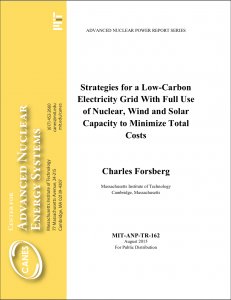Full Title: Strategies for a Low-Carbon Electricity Grid With Full Use of Nuclear, Wind and Solar Capacity to Minimize Total Costs
Author(s): Charles Forsberg
Publisher(s): Center for Advanced Nuclear Energy Systems (CANES)
Publication Date: August 1, 2015
Full Text: Download Resource
Description (excerpt):
Variable electricity demand has been historically met by burning fossil fuels. Operating fossil plants at part load is economically viable because the capital costs of fossil generating plants are low relative to fuel costs. In a low-carbon world, electricity is generated by capital-intensive, low-operating-cost nuclear, wind, and solar generators, where full power electricity output does not match demand on an hourly to seasonal basis. Operating capital-intensive facilities at part load is expensive. Five classes of technologies were identified to enable full utilization of capital-intensive nuclear and renewable generating resources to match electricity production with demand that includes most technology options. The classification is based on the differences between heat and work (electricity). Each class of options can help avoid electricity price collapse that occurs in a deregulated market when electricity production capacity with low-operating-cost technologies exceeds demand, drives prices to very low levels and creates major barriers to the larger-scale use of low-carbon generating technologies. Each class of technology has different characteristics, can be treated as a “black box” relative to impacts to the grid, and provides a basis to develop strategies for a low-carbon grid. Fully utilizing expensive capital-intensive electricity generating resources minimizes total societal costs.
